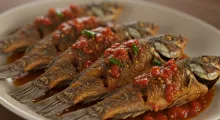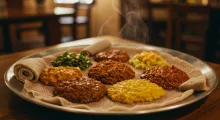When you think of North African cuisine, your mind may wander to fragrant tagines, couscous dishes, or the rich aromas of mint tea. Yet hidden within the region’s culinary tapestry are small but powerful snacks that embody simplicity, nourishment, and tradition. One of these is the date ball with nuts—a natural energy bite made by blending soft, sweet dates with crunchy nuts and rolling them into bite-sized delights.
These snacks are more than just treats; they are reflections of North Africa’s reliance on dates as a staple food and source of energy. Known as the “bread of the desert,” dates have been cultivated and consumed for thousands of years, especially by communities living in oases and arid regions. Paired with almonds, pistachios, or walnuts—nuts that also thrive in the region—date balls represent a marriage of heritage and modern health-conscious eating.
In recent years, energy bites have become a global trend, often marketed as “clean eating” or “no-bake snacks.” But for North Africans, the concept is nothing new. Date balls have always been part of the culture, served during festivals like Ramadan, shared with guests alongside tea, or enjoyed as a quick boost during long journeys across the Sahara.
This article explores the cultural significance of dates in North Africa, dives into the history of these sweet energy bites, and provides a step-by-step recipe for making them at home. By the end, you’ll see how something so small can carry centuries of tradition while fitting perfectly into modern lifestyles.
The Importance of Dates in North African Culture
Dates are inseparable from North African identity. Across Morocco, Algeria, Tunisia, Egypt, and Libya, date palms dominate the desert landscape, offering nourishment, shade, and economic value.
- Historical role: Dates are believed to have been cultivated for over 6,000 years. They were crucial for desert dwellers and traders, providing portable, long-lasting energy during long treks across arid landscapes.
- Religious significance: In Islam, dates hold special importance. The Prophet Muhammad is said to have broken his fast with dates, a practice still followed by Muslims worldwide during Ramadan. In North Africa, date-based sweets and drinks are central to iftar meals.
- Culinary versatility: Dates are eaten fresh, dried, or turned into syrups and pastes. They appear in savory stews, sweet pastries, and simple snacks like stuffed dates.
The date ball is essentially a modern yet traditional snack, showcasing the fruit’s natural sweetness without added refined sugar. When combined with nuts, it becomes a balanced bite of carbohydrates, healthy fats, and protein—nature’s energy bar.
Nuts in North African Cuisine
Alongside dates, nuts play a major role in North African cooking. Almonds, pistachios, and walnuts are especially beloved, often used in pastries like Moroccan briouat or Tunisian baklava.
- Almonds: Abundant in Morocco and Tunisia, almonds symbolize hospitality and prosperity. They are frequently paired with dates in confections.
- Pistachios: Often used for garnish in Algerian and Libyan desserts, pistachios add color and a luxurious touch.
- Walnuts: Valued for their rich flavor, walnuts are commonly ground into fillings or mixed into sweets.
The pairing of nuts and dates reflects not just flavor harmony but also nutritional completeness. Together, they offer sustained energy, making them ideal for long fasting days, travel, or as a wholesome modern snack.
Recipe: Date Balls with Nuts (North Africa)
These no-bake bites are quick to prepare, require minimal ingredients, and can be customized with different nut and spice combinations. They’re excellent for Ramadan, tea time, school lunch boxes, or as a natural alternative to energy bars.
Ingredients
(Makes about 15–20 balls)
- 2 cups soft dates (Medjool or Deglet Nour are traditional and ideal)
- 1 cup mixed nuts (almonds, walnuts, or pistachios work best)
- ½ teaspoon ground cinnamon
- ¼ teaspoon cardamom (optional, for extra warmth)
- 1 teaspoon orange blossom water (or vanilla extract)
- 1 tablespoon sesame seeds (optional, for rolling)
- 2 tablespoons shredded coconut or cocoa powder (optional, for coating)
Instructions
Step 1: Prepare the dates
- If using dried dates, soak them in warm water for 10–15 minutes to soften. Remove pits if not already pitted.
Step 2: Process the nuts
- Place the nuts in a food processor and pulse until finely chopped but not completely powdered. You want some texture.
Step 3: Blend the mixture
- Add the dates, cinnamon, cardamom, and orange blossom water to the nuts. Blend until the mixture becomes sticky and holds together when pressed.
Step 4: Shape the balls
- Scoop small portions and roll them between your palms to form bite-sized balls.
Step 5: Coat and garnish
- Roll some balls in sesame seeds, others in shredded coconut, or dust lightly with cocoa powder for variety.
Step 6: Chill and serve
- Refrigerate for at least 30 minutes to firm up. Serve with mint tea for a traditional touch.
Tips for Success
- Choose soft dates: Medjool dates are ideal because of their natural caramel-like texture, but Deglet Nour (widely grown in Tunisia and Algeria) works beautifully too.
- Spice it up: Add nutmeg, cloves, or ginger for warming depth.
- Play with coatings: Try crushed pistachios or even a drizzle of melted dark chocolate for extra indulgence.
- Storage: These keep well in an airtight container in the refrigerator for up to 2 weeks. Perfect for meal prep!
Nutritional Benefits
Date balls aren’t just tasty—they’re nutrient-dense:
- Dates: High in natural sugars, fiber, potassium, and antioxidants. Provide quick energy without refined sugar.
- Nuts: Rich in healthy fats, protein, vitamin E, and minerals. Contribute satiety and sustained energy.
- Spices: Cinnamon and cardamom aid digestion and add anti-inflammatory properties.
Together, these make an excellent snack for athletes, busy professionals, children, or anyone seeking clean energy.
Cultural Context: Where Are They Eaten?
These energy bites are rooted in North African culinary traditions, especially in:
- Morocco: Served during Ramadan, weddings, and tea ceremonies. Often flavored with cinnamon, sesame, and orange blossom water.
- Tunisia and Algeria: Known for variations of stuffed or rolled dates, sometimes filled with almond paste and rolled in nuts. Date balls are a simplified, modern version.
- Egypt and Libya: Dates are eaten daily, often paired with nuts as quick snacks, especially during fasting periods.
While modern “date balls” may look trendy on Instagram, their essence has been part of North African food culture for centuries. The contemporary recipe simply presents them in a portable, globally appealing form.
Serving Suggestions
- Traditional style: Serve alongside a pot of Moroccan mint tea.
- As a dessert platter: Mix with other North African sweets like makroud or sesame cookies.
- On the go: Pack into containers as a healthy alternative to processed snacks.
- Gifting idea: Arrange in decorative boxes for festive occasions like Eid or weddings.
Conclusion
Date Balls with Nuts are proof that some of the simplest recipes carry the deepest heritage. In North Africa, where the date palm is both a symbol of survival and hospitality, combining dates with nuts is a time-honored tradition. Today, this humble snack resonates beyond the region, embraced by health-conscious eaters worldwide as a natural energy bite.
Whether you prepare them for Ramadan, as an afternoon pick-me-up, or as part of a cultural culinary journey, these treats bring together flavor, nourishment, and history in every bite.
So next time you crave something sweet yet wholesome, skip the packaged snacks and try your hand at making North African Date Balls with Nuts—a little taste of tradition, packed with natural energy.


